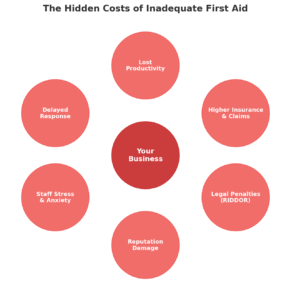When businesses think about first aid, many stop at the basics: a stocked kit in the cupboard, a poster on the wall, and maybe a designated first aider. But the reality is that inadequate first aid training carries hidden costs that can affect not only the wellbeing of your people but also the financial and reputational health of your organisation.
1. Delayed Response in Emergencies
In an emergency, every second matters. Without proper training, staff may panic or waste valuable time trying to figure out what to do. Even minor delays in treating burns, bleeding, or cardiac arrest can make the difference between a quick recovery and a long-term injury — or even between life and death.
The hidden cost: Increased risk of serious outcomes, longer recovery times, and greater liability for the business.
2. Lost Productivity
When injuries or illnesses are not managed properly on site, employees often need more time off work. Something that could have been treated quickly and effectively becomes a prolonged absence. Colleagues may need to cover shifts, workloads pile up, and morale suffers.
The hidden cost: Ongoing disruption, reduced efficiency, and the financial impact of sick leave.
3. Higher Insurance and Compensation Claims
Employers have a duty of care to provide a safe working environment. Inadequate first aid provision can lead to higher rates of workplace incidents escalating into costly claims. Insurance premiums rise, and in some cases, businesses may even face fines for non-compliance with regulations.
The hidden cost: Increased operational expenses and potential legal repercussions.
4. When Accidents Must Be Reported Under RIDDOR
Certain accidents, injuries, and illnesses must be reported to the Health and Safety Executive (HSE) under the Reporting of Injuries, Diseases and Dangerous Occurrences Regulations (RIDDOR). These include:
-
Deaths and serious injuries such as fractures (excluding fingers and toes), amputations, or serious burns
-
Incidents resulting in an employee being off work or unable to perform normal duties for more than 7 consecutive days
-
Occupational diseases like carpal tunnel syndrome or dermatitis
-
Dangerous occurrences (near misses) that could have caused serious harm
Failing to report under RIDDOR is a criminal offence. If HSE investigates and finds inadequate first aid arrangements contributed to the incident, the business could face significant fines, enforcement action, or even prosecution.
The hidden cost: Legal penalties, stricter scrutiny from regulators, and long-term reputational damage.
5. Why Online-Only Training Isn’t Enough
While e-learning can be useful for theory, the HSE strongly recommends that first aid training includes an element of face-to-face learning. That’s because vital skills like CPR, choking response, and bandaging techniques can only be properly developed through practical, hands-on practice with expert feedback.
Purely online training does not adequately prepare someone to act confidently and competently in a real emergency. Without muscle memory and real-world practice, even the best theoretical knowledge may fail under pressure. 👉 Use the HSE guide “Selecting a First Aid Training Provider” to make sure your team is getting the right training. GEIS3 – Selecting a first aid training provider – A guide for employers
The hidden cost: A false sense of preparedness that crumbles when real emergencies happen.
6. Damage to Reputation
A workplace accident that is poorly handled doesn’t just stay internal. Employees talk, stories spread, and reputations are built on how well companies care for their people. A business known for neglecting safety and training may find it harder to retain staff, win contracts, or attract new talent.
The hidden cost: Loss of trust, brand damage, and reduced competitiveness.
7. Emotional Toll on Staff
It’s easy to underestimate the psychological impact of being unprepared. Employees who witness an accident but don’t know how to help can suffer stress, guilt, and anxiety afterwards. Proper training empowers people, giving them the confidence to act decisively and effectively in emergencies.
The hidden cost: Decline in staff wellbeing and confidence in the workplace.
Investing in Training Pays Off
Adequate first aid training isn’t just about ticking a compliance box. It’s an investment in your people, your culture, and your bottom line. By ensuring your team is confident and competent in responding to emergencies — and by staying compliant with legal duties like RIDDOR — you reduce risks, improve outcomes, and demonstrate real commitment to staff welfare.
At JPF First Aid, we specialise in practical, engaging training that prepares your team for real-life situations. Our courses combine essential theory with hands-on, face-to-face learning, ensuring your staff don’t just know what to do, but can actually do it when it matters most.
✅ Take Action Today
Don’t let hidden costs or compliance failures catch you out. Protect your staff, your business, and your reputation with professional first aid training.
📞 Contact JPF First Aid today to discuss your training needs and book a course that gives your team the confidence and skills to act when it matters most. Please also see our website for forthcoming courses – https://www.jpffirstaid.co.uk.


